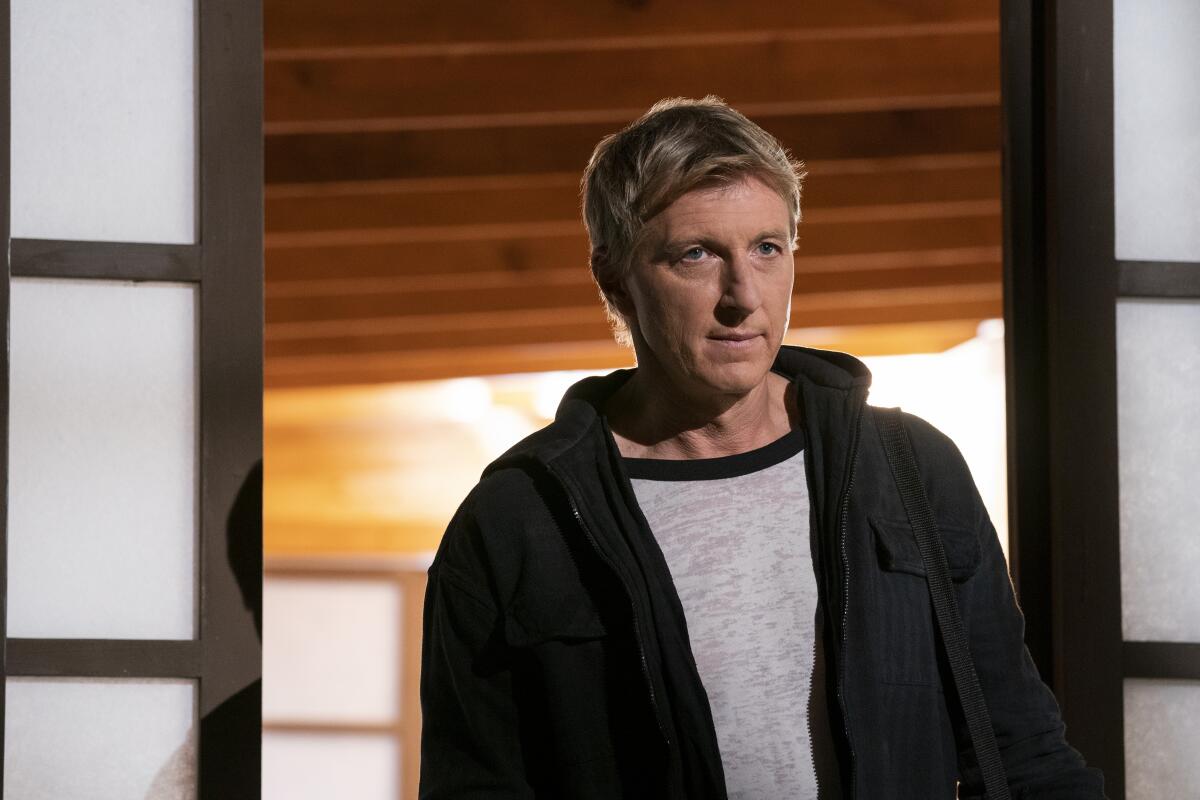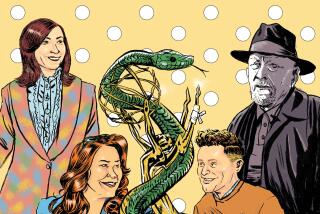How William Zabka turned ‘Cobra Kai’ into a comedy worth taking seriously

The Emmys aren’t until September, but I’m kicking off the Nominate “Cobra Kai” Movement now. Season 4 of Netflix’s martial arts series, and more pointedly its lead William Zabka, should be top contenders in the comedy categories. If I could end this paragraph with a low roundhouse kick and knee strike to drive my point home, I would.
I understand this crusade is an uphill climb. I’m advocating for the aging Television Academy to vote for a young adult series where teens beat the crap out of each other, and the show may as well have dropped from the sky when it premiered in 2018 and ran for two seasons on YouTube Premium. It did land a comedy series nomination last year after moving to Netflix, and its mini-mall brawls and karate championship showdowns made it stand out among kid-gloved nominees such as “Emily in Paris,” “Ted Lasso” and “The Kominsky Method.” Fans delighted in the ruckus and the humor, but the action may have distracted voters from “Cobra Kai’s” strength as an inventive, cohesive series that over four seasons has refined its comedic rhythm like its characters have perfected their fighting skills.
For the record:
3:18 p.m. Jan. 5, 2022An earlier version of this story misidentified the actor who plays Daniel LaRusso’s daughter. It is Mary Mouser, not Courtney Heneggler.
At the forefront of the charge is series lead and co-executive producer William Zabka. He reprised the role of Johnny Lawrence, the rich-kid bully from the 1980s “The Karate Kid” film franchise who rivaled working-class good guy Daniel LaRusso (Ralph Macchio). Their fortunes are reversed in the TV series, where Lawrence is a divorced, often out-of-work handyman and former sensei of the ruthless dojo Cobra Kai. He’s emotionally stunted, lacks basic social skills and has a cultural barometer that’s stuck in 1985. When coaching a young male mentee under the banner of his new dojo, Eagle Fang (bahaha!), he explains that the world is always conspiring to make you less of a man. His proof: Light beer. Veggie burgers. Automatic transmissions.
William Zabka’s Johnny Lawrence never left the San Fernando Valley circa 1984. And Netflix’s “Karate Kid” sequel plays with that disconnect brilliantly.
Johnny’s glacial self-improvement — two good deeds forward, three six-packs back — could have become a mere shtick in another performer’s hands. But Zabka has craftily pushed the stubborn character to grow without forfeiting Johnny’s dude-like essence. Though set in his ways, the All-Valley tournament champ is never the same from season to season, despite his penchant for Judas Priest cranked to 11 and Manwiches seasoned with beef jerky.
He is the heart and soul of the show. This season he’s conceded to work with rival LaRusso, who’s now the owner of a successful car dealership — which makes Johnny both question and double down on his Strike First, No Mercy policy. The story unfolds around him with the returning cast, more original characters from the films (Thomas Griffith as the scheming Terry Silver) and new additions to the teenage crew (like Dallas Dupree Young‘s Kenny). Cobra Kai, usurped by John Kreese (Martin Kove), is a threat to all that’s good and noble about karate, and the series continues to draw on the themes that made the films resonate: anger versus restraint, the wealthy versus the working class, winning at all costs versus moral responsibility. Though rooted in the history of the films, the story is compelling and fresh thanks to new twists, character turns and the cunning refusal to take the ’80s-era earnestness too far before making fun of it.
A bigger platform means new scrutiny for the “Karate Kid” spinoff, indebted to Eastern traditions but from white creators and a largely white cast.
The drama plays out in the San Fernando Valley, from the tony hills of Encino where the LaRussos live (including wife Amanda, played by Courtney Henggeler, and daughter Samantha, played by Mary Mouser) to the flats of Reseda, where Johnny and his mentee Miguel (Xolo Maridueña) live in an unironic, rundown midcentury apartment complex. The teens are destined to repeat the mistakes of their parents if something, or someone, doesn’t change their ways.
And so we’re back at Zabka. As Johnny, he’s still trying to survive financially after the duplicitous Kreese stole his dojo, and is struggling to keep up with a world that’s changed drastically over his lifetime. He’s growing ever so slowly with each new sober experience, so forgive him if he stumbles over pronouns and thinks “gender fluid” is a sports drink. Zabka is masterful in setting off tiny light bulbs of promise and progress inside an otherwise hardheaded and seemingly hopeless case. He subtly makes the case that guys who eat 7-Eleven hot dogs for breakfast deserve love and respect too.
Thanks largely to Zabka, “Cobra Kai” is a comedy that needs to be taken seriously.
‘Cobra Kai’
Where: Netflix
When: Any time
Rating: TV-14 (may be unsuitable for children under the age of 14)
More to Read
The complete guide to home viewing
Get Screen Gab for everything about the TV shows and streaming movies everyone’s talking about.
You may occasionally receive promotional content from the Los Angeles Times.







